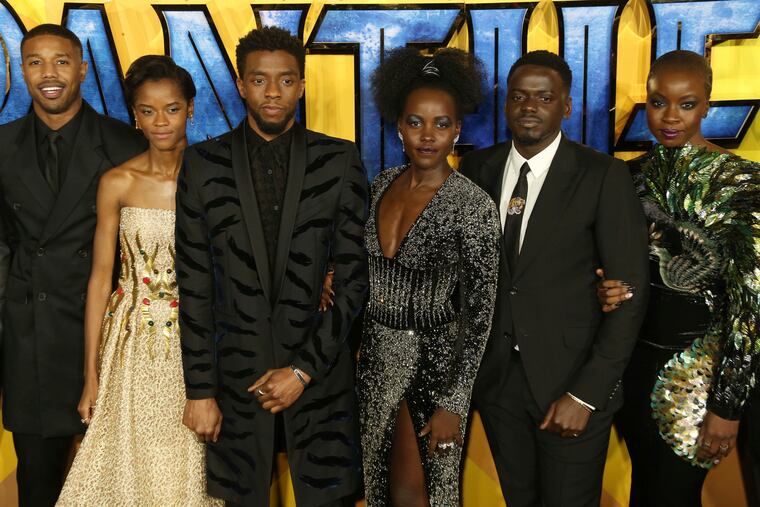Chadwick Boseman was deliberate about the roles he chose. He wanted to uplift the image of Black Americans and others of African descent.
Chadwick Boseman created a career with uplifting roles that portrayed Black people as strong, intelligent and resilient

Chadwick Boseman was at the height of global popularity as the star of Black Panther when he returned to Howard University, his alma mater, to speak to the Class of 2018.
He returned “home” a hero that day, on May 12, 2018.
Black Panther, the first film in the Marvel Cinematic Universe to feature a Black superhero as its star, had opened three months earlier and had grossed $1.3 billion in box office receipts by the end of May .
Since . Boseman’s death from cancer last Friday, many who knew him said he had deliberately crafted a career and selected roles that portrayed Black people in uplifting images.
“I stand here today knowing that my Howard University education prepared me to play Jackie Robinson, James Brown, Thurgood Marshall, and T’Challa,” he told the graduating seniors.
He was speaking of the roles he played with an intensity and eloquence in the films 42, about Robinson’s fraught-filled years as the first Black baseball player in the major leagues; in Marshall, as the late U.S. Supreme Court justice as a young lawyer; and, as the newly crowned king of Wakanda in Black Panther.
Maori Karmael Holmes, founder of Philadelphia’s BlackStar Film Festival, who attended Howard with Boseman, told the Inquirer’s Elizabeth Wellington: “Now we know that he was definitely crafting his legacy as an artist that was focused on how Black people — in particular, Black men — were represented on screen.”
Years before Boseman entered Howard, journalism students there read a book of essays by the late historian and Ebony magazine editor Lerone Bennett Jr., who wrote in “The Challenge of Blackness” that images are powerful.
“The image sees. The image feels. The image acts. And if you want to change a situation, you have to change the images men have of themselves and of their situation.”
Louis Massiah, director and founder of Scribe Video Center, said, “Actors and artists emerge out of a social and political context, and certainly when one looks at many of the film artists that have come out of Howard, many are extraordinarily conscious.
“I’m thinking of [filmmaker and Howard professor] Haile Gerima. He [Boseman] studied with Phylicia Rashad, who both went to Howard and taught there, and you have folks like Bradford Young, an extraordinary cinematographer whose times at Howard crossed with Chadwick.”
Massiah, named a MacArthur Fellow in 1996, said it takes more than one person to build a career with strong, solid portrayals of characters, beyond what for years has been standard tropes in Hollywood, such as the stereotypical images of Black men and women as criminals, drug addicts and prostitutes.
It’s more than “timing” and arriving on the scene when Hollywood began to see the importance of diversifying the quality of roles for Black artists, Massiah said Monday.
“You have to remember, those roles have to exist,” he said. “If no one has written a Thurgood Marshall film, it’s not like Chadwick Boseman is going to suddenly do the role. There have to be a writer, director, and producer who are doing the project.”
Massiah also noted that Boseman brought with him a remarkable talent.
“He was a very, very, serious actor. There are lots of good actors, really. He’s not alone. What was exceptional about Chadwick is because of his excellence, he was able to shine and able to get starring lead roles.”
At that graduation two years ago, Boseman talked about a time when he was “conflicted” about a soap opera role he had taken early in his career.
The role was about a “young man in his formative years with a violent streak pulled into the allure of a gang,” he told the graduates. Although he never named the soap during his speech, it was All My Children on ABC.
When Boseman spoke to the show’s executives to ask details about the teen’s character -- “Where was his father? “What happened to his mother?” -- he found out the next day he had been fired from the show.
He was looking for a way to show complexity in the character despite his circumstances. There was “barely a glimpse of positivity or talent in the character, barely a glimpse of hope,” he told the Howard students.
He told the graduates, he wondered if he was being blackballed. He spoke of being broke and worried about getting enough money together to take the subway to theater auditions.
“But what do you do when the principle and the standards that were instilled in you here at Howard closed the doors in front of you? Sometimes you need to get knocked down before you can really figure out what your fight is and how you need to fight it.”
The director Spike Lee, who worked with Boseman on the film Da 5 Bloods , which came out in June, has also had a long fight with Hollywood over the stories and images of Black people.
“The American film industry was never set up for people of color to succeed,” Lee said in an interview with Commerce and Creativity last year , “so I made sure that in my films there was diversity amongst gender and race… It was going to be my decision and I had the power to hire who I wanted. When you are in a position of power, utilize that… I knew I had to if I wanted to have an impact in changing the complexion of this industry.”
He also posted a comment over the weekend about Boseman on his Instagram.